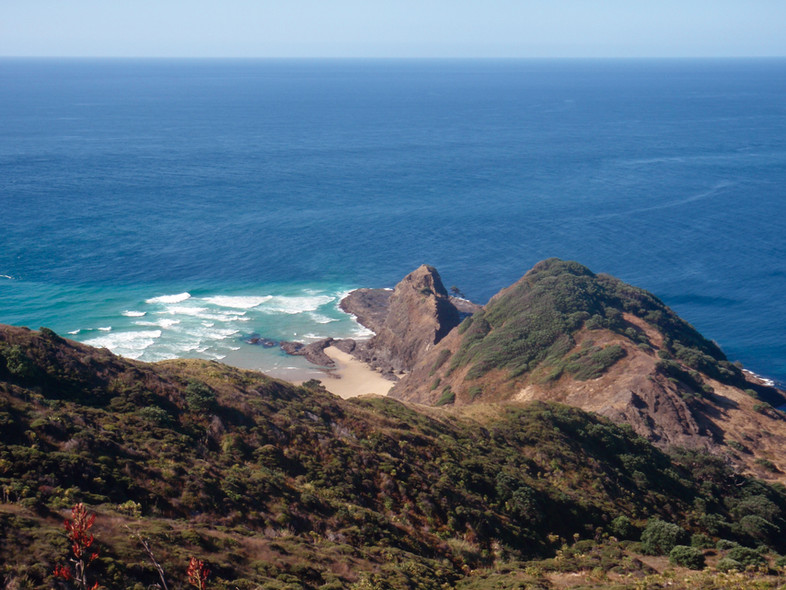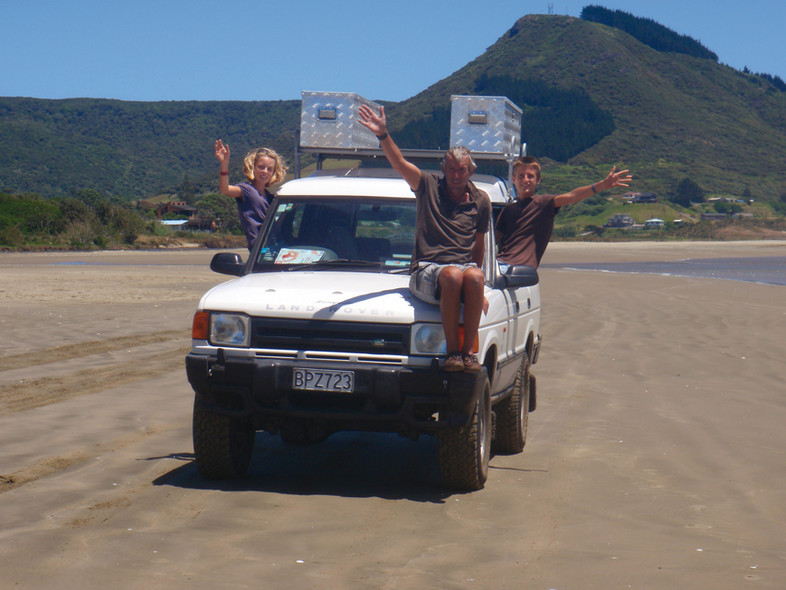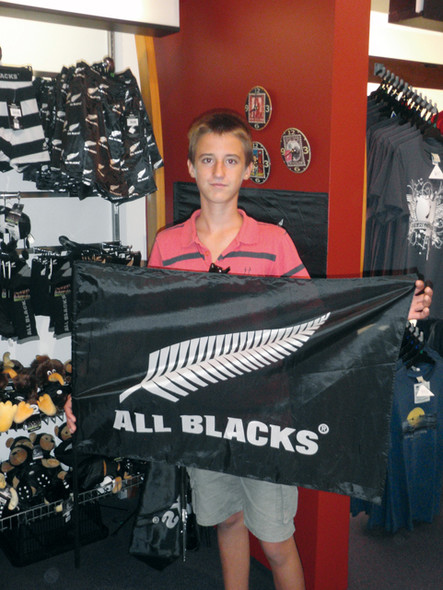
Issue #: 148
Published: July / August 2016
- Price per issue - digital : 5.40€Digital magazine
- Price per issue - print : 6.20€Print magazine
- Access to Multihulls World digital archives Digital archives
We are following Olivier and his family aboard Jangada during their round the world voyage. After long months aboard the boat, they are now at the half-way point, on a prolonged stopover in New Zealand. A welcome and particularly appreciated break.
Whangarei is the biggest town in Northland (around 50,000 inhabitants). On the Town Basin Marina pontoon, the marina manager himself, Brian Caulton, took our lines. We are not used to this, back home. Service above all, and with a smile. This was our first impression, on setting foot in New Zealand: the locals are pleasant, kind, friendly. We were tied up for a few days in the very heart of the town, after our passage from Tonga. We noticed cars, grandmothers taking their grandchildren for a walk, strapping men wearing farmer's hats drinking Red Lion on the terrace of a caf_, Japanese car dealerships, and shops. Barbara and the kids were fascinated. Let loose in the town, eager to run around, like dogs that have been kept on a lead for too long in the relative destitution of the basic little grocers in the Pacific islands. Note that I was not the last person to appreciate this new-found abundance, for a while. The notion of happiness, in its material aspect, is without a doubt relative. Take away the possibility of comparison, and you would have difficulty appreciating it. A long term voyage leads you to seek a frugality with which you are happy. We must voyage, therefore. Voyage, like a moral requirement for personal salubrity. The voyage helps to put things in their place, and keep them there.
But for the moment, after several months of relative gastronomic deprivation (or rather monotony) in the Pacific islands, our voyage turned for once towards alimentary materialism! To give you an idea, the Captain had gone from 92kg at the start to 79, but above all, the children were not very fat when we arrived here. One of the crew's first reactions, on the pretext of simply going to 'get some fresh bread for this evening', was in reality to rush to an ANZ (a local bank) ATM, and dive into the nearest yellow-signed supermarket to the pontoon: Pak'n'Save! And there, they had a shock. Firstly, visual. The shock of rediscovered alimentary abundance. Complete shelves of fruit, vegetables, meat, fish, a wine section, white or red, incredibly well-stocked with French varieties, cubic meters of bread, and cheese, marked (here I think we were being taken for a ride...) 'Sweet creamy Camembert' or 'Soft ripened Brie'. The era of the boycott of French products in New Zealand, following the incident involving the French secret service against Greenpeace's 'Rainbow Warrior' in the port of Auckland in July 1985 is well and truly over! France has progressively regained a special place in the hearts of the New Zealanders. Our sailors and their beautiful machines, and sometimes the exploits of our national rugby team against the All Blacks impress here. After the first visit to 'Pak'n'Save', the everyday fare aboard improved radically. The popularity of the home-preserved Atlantic Sailfish and the Pacific Marlin aboard had dropped! What am I saying, it was in freefall! Fresh cream reappeared in the sauces, there was meat on the menu for every meal, followed by cheeses and a little red wine, with kiwi fruit for dessert... The on-board heads were also deserted. For one New Zealand dollar, the hot shower in the marina premises was a hit. Barbara also had the local washing machines working flat-out: everything went in, and I am sure that at one moment, just after changing the oil in the two Volvo engines, I myself was nearly thrown into the stainless steel drum for a quick wash... In a hurry to finalize our other family voyage configuration (with a suitable vehicle), I very quickly launched into laying-up Jangada, and the first jobs on the 'to do' list, before she came out of the water. Between the long-term storage procedure for the watermaker membrane, and the meticulous inspection of each of the standing rigging terminals, between the oil change-filters-levels service of the engines and dismantling the WC pipes, furred up by the sea water, I went on the internet, to visit the Trade Me site, used by all New Zealanders to buy and sell second-hand items. I was looking for a cheap, second-hand motor caravan. From time to time, since I had been looking for an old motor caravan, Barbara whispered in my ear that she could hardly imagine me at the wheel of such a vehicle. Too soon, too young for a motor caravan. I was flattered. Finally, I found the prices of motor caravans unreasonable for just a few months. We changed tacks. I started to look at 4 x 4s.
I spoke about it to Brian, and he told me that there was a guy on a little trimaran, there on the other side of the river, who had just told him he was selling his Land Rover! He phoned him in front of me: it was a 1997 Discovery, with 96,000 miles on the clock, in good condition, with a 4-litre petrol V8 engine... Err, fuel consumption on this kind of thing is a bit high... But in general, because of this, they are not very expensive. And for a few thousand kilometers... Problem _ the guy had already signed a sales order with a professional! Marin and I borrowed two bikes and sped towards Whangarei's port zone. We were going to try out the vehicle, and to my great surprise, the seller made me sign a paper, but didn't come with us for the test. It's customary here. We thus tried out the vehicle freely. 10 km and a visual and auditory inspection later, lying under the machine, and the test was conclusive.
So now we had a Land Rover Discovery as our new travelling companion! Cost _ equivalent to around 2,500 euros. Insurance taken out by a visit to AA, and official documents obtained in a few days by post. All that remained was to equip it for camping, as we had left all our equipment in France. As soon as our program of technical servicing and maintenance aboard the boat allowed us, we set off to walk the footpaths around Whangarei. Chlorophyll replaced iodine, what a pleasure. The forest footpaths are pleasant, well-signposted and well-maintained, thanks to the DOC, New Zealand's Department of Conservation, whose work didn't cease to impress us throughout our stay. There is an abundance of little rivers, streams and waterfalls in this verdant country. There isn't a house which doesn't have a garden, a lawn, always perfectly mown. New Zealand is the country of the outdoors. Often, next to a house, we caught a glimpse of a transportable motor boat on its trailer (more often than a sailing boat), a 4 x 4, and a motor caravan. And always the essential gas barbecue, of a respectable size. With our new four-wheeled toy, we set off to explore the east coast, north of Whangarei. The children had brought along our rugby ball, and the kites from 'La Tortue', sunk at Kelefesia. Around Bream Head, after Parua Bay, young bulls ran around in a huge undulating meadow and came to observe the strange thing flying in the sky. When the kite crashed, the animals came to sniff it. The girls were worried, Marin was at the controls and I was looking after the take-off, with my bovine fan-club behind me, which I was nevertheless keeping a close watch on out of the corner of my eye. After the ocean air, Jangada's crew was turning to the green!
Cape Reinga, in the far north of New Zealand, North Island
The first part of our stay in New Zealand took place on the quay, in Whangarei town center. A peaceful place, equipped with unlimited water and electricity. A luxury we hadn't tasted since leaving France. Here we laid up the boat and made our first contacts with the New Zealanders, discovering their way of life _ quite appealing, in a protected natural environment to which they are very attached. We then took the boat out of the water with a hydraulic trailer, at the Norsand Boatyard on the Whangarei river (a good address), a few kilometers downstream from the town center, for a stay of just over a month. Scrub off, dismantling the propellers, manufacture and fitting of new deflectors under the bridgedeck (to avoid sea water spray at high speeds!), repair of the coral scrapes on the bottom of the stub keels suffered at Limu Island, removal of the rudders, replacement of the lower rudder bearings with ball joints turned to measure, dismantling and greasing the winches, fitting new pumps, cleaning the seacocks, new antifouling and a thousand other little jobs. Our new car was a precious asset for getting through our list of jobs quickly, and I soon knew the whole of Whangarei's industrial zone like the back of my hand. As the work progressed on the boat, I started to take more time to fit-out our 4 x 4 - roof rack, two big aluminum boxes fixed on the roof, acquiring camping equipment and maps, servicing the V8, etc.
For the first time, all four of us left to go camping for a few days in our 4 x 4, to discover the west coast and the extreme north of the North Island. As soon as it was possible, we left the tarmac for the tracks and the sand. And on Ninety Mile Beach, a deserted beach which is really around 80 km long (there must be a misunderstanding somewhere along the line), the New Zealanders, who are nevertheless very 'green', and the omnipresent Department of Conservation, had no objection to us driving our 4 x 4 on the beach, next to the waves on the foreshore! The flexibility of New Zealand's spirit: pragmatism, not dogmatism. A nice country. The children took over the automatic Land Rover's steering wheel, and at 12 and 13 years old, covered the interminable ribbon of sand under the watchful eye of their father. We could almost settle in New Zealand!
Jangada's crew found a new way of travelling!
When we arrived in New Zealand at the end of October, the rugby season _ a sport taken seriously here! - had just finished. Bad news for us! Yes, it was almost the beginning of summer in the southern hemisphere! While looking for news on the internet, I had seen that the first matches of the new season would be taking place during February. I had then promised Marin that we would go to watch a match at Eden Park before leaving the country where the oval ball is taken very seriously. I went back on the net, and saw that the first encounter at Eden Park was a Super Rugby match, which would pit the Auckland Blues against the Christchurch Crusaders, the two biggest clubs in New Zealand! 23 All Blacks on the pitch! Not to be missed! Places chosen and booked on TicketMaster, tickets printed out aboard, and on the day, we headed for Auckland! I was so happy to be taking my son to Eden Park...
Eden Park isn't a very big stadium, but is above all a very beautiful one! Two hours and 160km later, we were approaching Eden Park. First surprise _ the stadium is built in a very calm, and quite smart residential area of Auckland. We reached it directly by car, with no problems. Numerous employees wearing 'Event Staff' vests were already in position, 4 hours before the kick-off. We parked in a quiet little road, 100 meters from the stadium. No litter on the ground, no chewing gum waste on the pavements, no abandoned beer cans in the gutter... Everything was clean, spotless, wooded, green.
After a quick search of our little rucksacks, the bar code on our pre-printed tickets was read and in just a few seconds, we found ourselves inside the enclosure of the most mythical pitch in rugby union. The terraces filled up progressively; a band played classic rock songs. In the middle of the pitch, the inevitable 'pom-pom girls' carried out an energetic, light choreography. The tension mounted in the stadium. I put my arm around Marin's shoulders, and smiled as I watched him: my son was beaming, and I was just so, so happy to be there, with him, at a big rugby match at Auckland's Eden Park! Nobody can take this nice shared memory away from us, eh son?
Life seemed pleasant in New Zealand. It was the first days of summer in the antipodes. Barbara's parents had made a first brief visit to Auckland at the beginning of December (acting as 'sherpas', loaded with lots of equipment, from the 4th year home-schooling lessons to the new waste water pump, via computer batteries and the latest French magazines...) before spending 10 days in Tahiti. They came back in the middle of December for a long, two-month stay, in three different houses, which they had exchanged with theirs in France. We had thus spent Christmas with them in a house at Parua Bay, about twenty kilometers east of Whangarei. Christmas without the cold, frost and snow, at the beginning of the southern summer. The Yule log was replaced by a Pavlova, a cake covered with meringue, with whipped cream and red fruits, highly prized by the Kiwis at Christmas. The children were not exactly unhappy. They drove the little (John Deere!) tractor in Adrienne and David's garden at Parua, and went to eat ice-cream at Pahia. Marin went surfing near Elliot Bay, while Ad_lie overused her new make-up bag and went to try on all the dresses in 'Farmers' shop in Whangarei, clearly taking advantage of her mother's absence, before deciding on a red dress which she had in reality spotted a long time previously... The mistress aboard had decreed four weeks' holiday for the occasion. Well-deserved, I think. As for us, the parents, we left for the South Island, for 3 weeks' discovery with the Land Rover. On the program, walks with backpacks, camping, and meeting up again with friends who had come from France, on the other side of the world! The children remained on the North Island with their grandparents. They went to stay for a month at Opua, a charming little place which reminded us of South Brittany, situated in the Bay of Islands, 70 km north of Whangarei, in the pretty house belonging to Frank and Jenny, called 'Captain's Retreat'. Frank is the captain of the 'Clipper Odyssey', a reasonably-sized cruise ship, and Jenny accompanies him aboard, where she also works. They were currently cruising in the Indian Ocean, and later Frank told us about his problems with pirates, whose perimeter of action has become worrying in this region, which would without a doubt oblige us in a few months' time to adapt our itinerary... Everyone was to meet up again in Opua on 17th or 18th January. Our program in New Zealand was appealing. Whilst Jangada, now back in the water, waited patiently for us in Marsden Cove marina, we went to stay around Tauranga, in the Bay of Plenty, south of Auckland, from 1st through 15th February. After Barbara's parents had left for France, we returned to the South Island with the children, for a last, 3-week stay. Then it was time to return aboard, to re-commission our catamaran, and prepare our departure towards the north. The hurricane season in the West Pacific was drawing to a close, and the moment had come to go and find the trade winds again, and the tropical sunshine. This was to be the second part of our round the world voyage, the return trip towards France, via southern Africa...
Marin in the land of rugby !



What readers think
Post a comment
No comments to show.